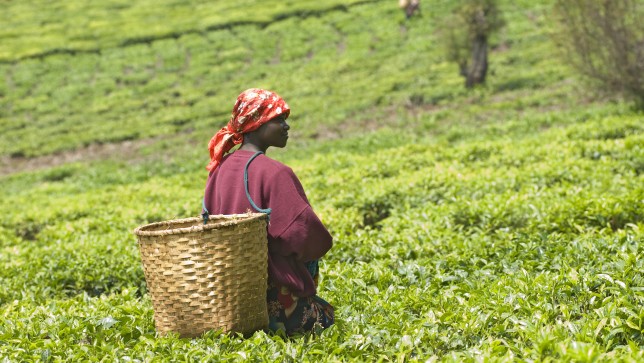The Bill and Melinda Gates Foundation (BMGF) and the United States Agency for International Development (USAID) are sponsoring a secret meeting Monday in London to promote a recent report detailing in clear terms how to privatize the seed and agricultural markets of Africa– without African stakeholders having a seat at the table.

The meeting is being criticized for including corporations, development bodies, trade bodies and aid donors, yet excluding any African farmers or representatives of affected organizations. Today protesters on both sides of the Atlantic are picketing to protest the corporate capture of seed, and to urge the foundation to support African food sovereignty. Both in London and Seattle protesters will distribute open-pollinated seeds as a symbol of the alternative to the corporate model promoted by USAID and BMGF.
The London meeting will discuss a study produced by Monitor-Deloitte which was commissioned by the Gates Foundation and USAID. BMGF is a major sponsor of the commercialization of agriculture in Africa including through its subsidiary the Alliance for a Green Revolution in Africa (AGRA). Working with USAID, this commercial agenda extends US foreign policy into Africa on behalf of corporate interests, threatening the livelihoods of millions of small-scale farmers who rely on recycling seed for their livelihoods.
Phil Bereano, food sovereignty campaigner with AGRA Watch and an Emeritus Professor at the University of Washington said, “This is an extension of what the Gates Foundation has been doing for several years – working with the US government and agribusiness giants like Monsanto to corporatize Africa’s genetic riches for the benefit of outsiders. Don’t Bill and Melinda realize that such colonialism is no longer in fashion? It’s time to support African farmers’ self-determination.”
The goal of the Monitor-Deloitte study is to develop models for commercialization of seed production in Africa, especially “early generation seed”, and to identify ways in which the African governmental sectors could facilitate private involvement in African seed systems. The study was conducted in Ethiopia, Ghana, Nigeria, Tanzania and Zambia on maize, rice, sorghum, cowpea, common beans, cassava and sweet potato.
The report exposes a typical approach of private sector “cherry picking”, where private companies identify any profitable public activities for their own involvement. While complaining incessantly about “heavy state involvement” they still insist on such involvement for unprofitable activities and permitting the private sector to take the profitable activities.
The Monitor-Deloitte report uses cowpea production in Ghana as an example of where the public sector should carry the extremely expensive improved cowpea breeder seed costs to allow the private sector to profit in seed multiplication and distribution. Breeder seed is prohibitively costly because of low multiplication rates and low demand. But the demand that exists is nonetheless lucrative, so the private sector wants to be involved only in the parts of the production process identified as profitable. Where the whole chain is profitable, such as hybrid maize or in closed value chains where there is strong but limited demand and early production processes are also potentially profitable, for example hybrid sorghum for brewing, Deloitte proposes the public sector be locked out of the production process.
Although historically, in Africa and around the world, farmers have been the traditional developers and distributors of improved seeds, the report does not even consider a potential role for farmers in the production or distribution of seed. Indeed farmers are viewed only as passive consumers of seed produced elsewhere.
The meeting in London and the focus of the report expose the agendas of the BMGF and USAID to enable private interests to profit from essential life processes in African agriculture.
Mariam Mayet Director of the African Centre for Biosafety (ACB) in South Africa said:“ACB insists that an equitable and sustainable solution to seed production and distribution can only come from direct engagement with farmers and their organizations to ensure their active involvement in these activities. We further insist that public-farmer partnerships to improve seed that integrates farmer and scientific knowledge will generate a more accountable process, and produce longer-lasting and more meaningful solutions for African agricultural production, than these profit-driven, exclusive and narrow processes.”



















The seeds are the means to keep the plants pure and Healthy and no business should interfere with foreign countries in order to get richer especially gates, who has no ability to see how wrong his ” support” is.
Secret Meetings?
What could they so fearful of?
Shouldn’t the Gates Foundation be proud of their efforts to feed the world?
Folks, please buy only organic seed. Please hold on to your organic seeds. Communities and countries the world over should creates seed banks — exactly what Bill Gates is doing … just in case GMOs should fail. And GMOs are failing.
American corporate “agriculture” is the greatest scientific fraud of all time.
Doesn’t Phil Bereano realizes that Bill Gates and his foundation have long ago gone over to the Dark Side ?
What is it about the super-rich ? Why do most of them use their wealth to perpetrate such grotesque crimes against humanity ?
Bill Gates, through the Gates Foundation, promotes Monsanto’s agenda of poisoning children, destroying the food supply of the planet and replacing it with inferior mutant look-alike products, and weakening humans so they are more susceptible to a whole host of diseases ?
Maybe Bill will have one of those “Saul-to-Paul” experiences, otherwise he will continue to incur tons of bad karma for himself. He could be a force for good, if he only would.